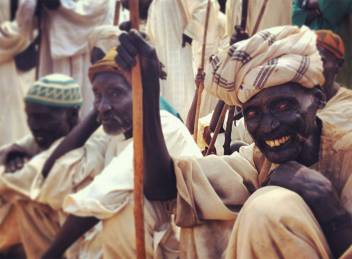 As South Sudan marks its third year of independence, we are more acutely aware than ever of the devastating impact of renewed violence. We estimate that 3.2 million people currently need humanitarian assistance and we are on the ground to support older people and their families affected by the crisis.
As South Sudan marks its third year of independence, we are more acutely aware than ever of the devastating impact of renewed violence. We estimate that 3.2 million people currently need humanitarian assistance and we are on the ground to support older people and their families affected by the crisis.
Juba, South Sudan’s capital, teems with UN agencies, NGOs and commercial businesses. I’m excited HelpAge is part of the effort providing hope to people hit by this crisis.
Only organisation providing for older people
I think of the older people we met in the internally displaced people (IDP) camps a couple of weeks ago who, despite the challenges they face, are hopeful things are going to change for the better. They told us it was the first time their specific concerns had been listened to.
We also met the chair of the health group to share our plans and opportunities to work with organisations providing health services in the IDP camps. “We don’t have any organisations addressing older people’s specific health needs, so I’m glad HelpAge is planning to fill this gap,” he said.
We returned to UN House, one of the two major IDP camps in Juba. We were stopped at the entrance by two young men who told us: “There is a cholera outbreak in Juba with a confirmed case in the camp. Every visitor has to have shoes sprayed and wash their hands before going in.” This is extremely worrying and another sign that the humanitarian situation is deteriorating.
Crowded and dirty
Walking around, the camp looked more crowded than our previous visit. A trench flowing with dirty water ran through. “The trench is sprayed with chemicals to manage disease outbreaks,” said our guide.
We came across a food distribution. Next to the distribution point was a tent put up by Oxfam. We were curious to know what was going on and walked in. We met two young people who told us they had set up the tent to record and share complaints from IDPs on the services provided.
This is a great initiative that could be strengthened with the participation of IDPs. We will ensure older IDPs are also able to voice their concerns through the older people’s committees we will set up with our local affiliate, the South Sudanese Older People’s Organization (SSOPO).
Older people cannot access services
Our visit to Mahad primary school that is housing another IDP camp was a different experience. There were a few families putting up shelters. They were either new arrivals or people who had been moved from one side of the site to the other. There was a notable presence of older people, but also a notable absence of coordination among agencies operating here.
A recent UNHCR assessment recognised that older people are living outside the two main sites that include Mahad, but it failed to outline their specific needs, access to services or the level of support structures available.
However, another assessment by Light for the World acknowledged that older people face a number of challenges, including the accessibility of services and limited support for older people living alone.
How we’re helping
HelpAge, in partnership with other organisations, will support older people affected by the crisis in various ways, including:
- Providing eye care
- Offering psychosocial support to help cope with the trauma of conflict
- Distributing essential items such as blankets and mobility aids such as walking sticks
- Establishing older people’s committees to ensure their concerns are heard by camp management
- Training other organisations to ensure their programmes include older people’s needs.
Although the situation at the moment is bleak, we will do everything we can to support older people and their families to ensure they are not forgotten in this humanitarian crisis and in the building of this new young nation.
Read more about how we’re helping older people affected in South Sudan and Ethiopia.
